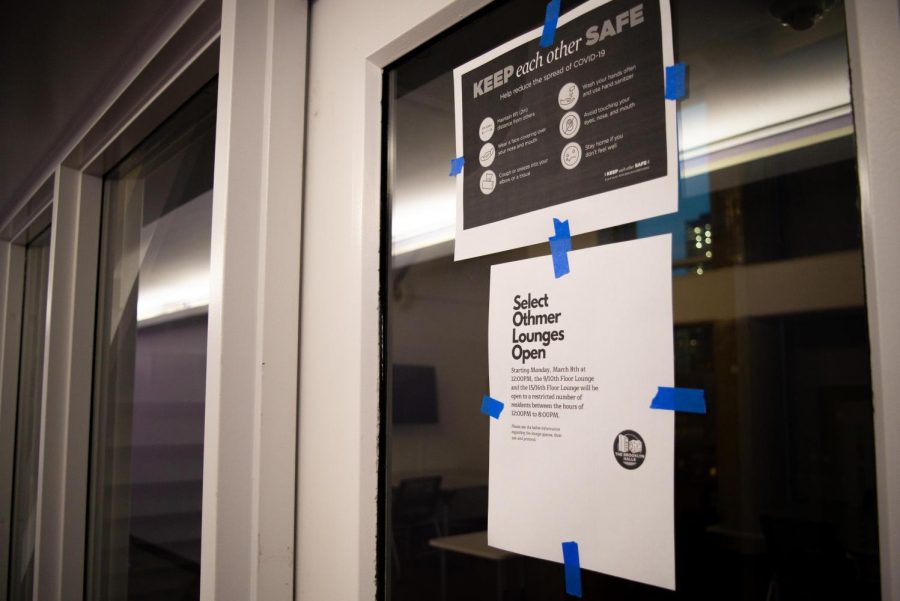Earlier this week, many NYU residence halls announced they are reopening their lounges to residents. The dorms reopening lounges are Brittany Hall, Gramercy Green, Palladium Hall, Othmer Hall, University Hall, Founders Hall, Carlyle Hall, Greenwich Hall and Lafayette Hall, as NYU Local previously reported. This step comes after a decrease in on-campus COVID-19 positivity rates as of press time.
“Now that COVID rates have begun to decrease at NYU, and in recognition of the exemplary behavior displayed by the vast majority of students, we have reopened some residence lounge space for limited use,” Senior Vice President for Student Affairs Marc Wais wrote in a statement to WSN. “We see it as a logical next step in easing ourselves back into normal operations.”
Lounges at a few residence halls remain closed, but Steinhardt first-year Lindsay Dievert is glad to see the university expanding opportunities for safe indoor socialization.
“I think it’s a good idea to have them open because when it’s colder, it’s much harder to find places to safely hang out with friends,” Dievert said.
Before the pandemic, student lounges did not typically open and close according to a schedule. Now, lounges will open at noon and close at 8 p.m. to facilitate supervision. According to the Brittany and Palladium building leadership teams, Public Health Ambassadors and Community Space Assistants will supervise the lounges to encourage adherence to safety guidelines, which prohibit eating and drinking.
The reopening of residence hall lounges comes just weeks after six students were suspended for organizing and participating in parties, according to a Feb. 19 message to students from Wais. It also comes only weeks after a “small but conspicuous” uptick in COVID-19 cases, according to a Feb. 25 letter sent to the university community from the provost.
The 14-day rolling average of COVID-19 positivity on campus — which had declined from just over 1% in late January to less than 0.5% in mid-February — jumped from around 0.41% on Feb. 18 to 0.74% just four days later. The university’s positivity rate was 0.54% at press time.
Provost Katherine Fleming and Dr. Carlo Ciotoli, Executive Lead of the COVID Prevention & Response Team, did not respond to requests for comment on the rise in cases, student conduct and consequences, or the reopening of residence hall lounges.
“I would say that it is a valid punishment,” Tisch first-year Nathan Hughes said regarding the suspensions. “I feel like the university can expect more from us because we are at a school in a city that was a COVID hotspot.”
Like Hughes, Tisch first-year Maddie Provost believes NYU students’ adherence to safety guidelines impacts the greater community.
“We do have a duty as New Yorkers to respect restrictions and not get our communities sick — especially as [COVID-19] is affecting Black and brown communities more,” Provost said.
Students who violate safety guidelines in lounge spaces can expect to be documented and face sanctions or other consequences, according to a resident assistant who asked to remain anonymous, citing employment repercussions.
“I think [reopening lounges] is not a choice I would make, but I’m certain that many residents will appreciate it,” the RA said.
Wais commended the university community’s high level of compliance with safety guidelines and acknowledged the importance of socializing to student life. He also said that NYU has not experienced any “significant campus-based outbreaks.”
However, he added, “we will also be monitoring the infection rate closely and should troubling positivity trends arise, we’ll respond swiftly and appropriately, with students’ health and safety being our first priority.”
This month marks a year of pandemic-related restrictions and social-distancing guidelines. NYC’s seven-day case average of confirmed and probable COVID-19 cases was more than 24,000 at press time. Indoor dining reopened on Feb. 12, and indoor entertainment and arts venues will be allowed to reopen at 33% capacity with a 100-person cap on April 2.
With the city loosening restrictions and the university preparing for vaccination efforts, some students think the university ought to start opening up, too.
“I think there does need to be an easing of sorts as the city eases up,” Stern junior Jackson Lee said. “Part of college is academics, but there is also a huge social portion to make lifelong friends.”
“I would hope the school would at least allow limited capacity dine-in for the students living in that same dorm,” he continued. “My freshman year, I made a lot of friends, and this year’s freshman class is not going to get nearly that experience.”
Provost believes that opening up could even keep students safe and out of trouble.
“I think there are better procedures that could be implemented, like opening more places for people to eat to avoid crowding,” Provost said. “If the university takes more precautions in creating more opportunities for indoor activities, people wouldn’t need to sneak around to do these things.”
But other students remain skeptical of the movement toward gradually reopening and would prefer a slower process to mitigate the chances of another outbreak.
“What concerns me most is that the city could be opening up too early and we could see a fourth wave, putting us back to square one,” Stern first-year Nick Bekos said.
“Until everyone gets vaccinated, there’s not much NYU can do,” Bekos added.
Email Saurabh Kumar at [email protected].

























































































































































